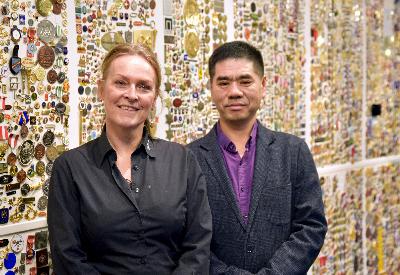133-year-old Danish family business ready for robots
Jydsk Emblem Fabrik A/S in Malling, Jutland produces medals, trophies, emblems, name tags and accessories for uniforms. Now, the family-owned company want to have collaborative robots working with their employees, and they’re doing this with engineers from Aarhus University.

"I think robots could become an entirely natural part of our workforce."
This is what Hanne Hørup, the managing director and co-owner of the 133-year-old family-owned company Jydsk Emblem Fabrik A/S, has to say about the prospect of, finally and with the help of Aarhus University, getting robots involved in their production chain.
The company, which has produced trophies, pins, medals and accessories for both private and state uniforms since 1886, has jumped aboard the university's Industry 4.0 development programme, Smart Industry. In brief, the programme is about getting small and medium-sized Danish companies involved in the technological, computer-programmed world of the future.
"Not to replace employees, but to give them a robot workmate. To give our employees the huge boost that robots can provide. By letting robots do the most repetitive work, we can increase production and reduce the strain on our employees. I see it as a huge benefit for everyone," says Hanne Hørup.
She was much more sceptical to start with, when her husband and fourth-generation owner of the company, Stig Hellstern, first took her by the hand and dragged her to a trade fair on robots.
Reluctant Danish SMEs
Back then, she couldn't imagine how large industrial robots could ever be an efficient part of their factory. But when she saw how collaborative robotic arms can simply and efficiently be incorporated into a production line and work together with people without risking accidents, she was sold on the idea.
And when Xuping Zhang, associate professor and expert on collaborative robots at the Department of Engineering, Aarhus University, contacted her to hear whether she was ready to collaborate, Hanne Hørup and Jydsk Emblem Fabrik A/S jumped at the chance.
"The idea is to integrate cooperation between people and robots into production, so that they share their work and cooperate fully. The goal is to increase efficiency by reducing the strain injuries that often result from monotonous, repetitive work, and to enable employees to focus on tasks with a higher value. Unfortunately, not many small and medium-sized Danish companies are willing to ride the robot wave, even though they’re increasingly worried about losing competitive ground to foreign Industry 4.0 companies, and even though it’s actually very easy to start a development programme with us," says Xuping Zhang about the collaboration.
Together with the machine supplier NIZE Equipment ApS, Jydsk Emblem Fabrik A/S and Aarhus University have now started a development project as part of the Central Denmark Region’s Smart Industry development programme.
Plenty of services available
The programme focuses on innovation-collaboration and knowledge sharing, whereby researchers from the university share knowledge with companies in order to optimise processes and incorporate new technology.
"There are many of these kinds of services for small and medium-sized enterprises, but many companies don’t even know that they exist. And that’s a shame, because it's fantastic to open up for the opportunities offered by modern technology," says Hanne Hørup about the project.
The development collaboration between Jydsk Emblem Fabrik A/S, NIZE Equipment ApS and the Department of Engineering at Aarhus University, is called "Integrating Human-Robot Collaboration into Danish SME Manufacturing and Production" and it will run from October 2019 to December 2020. The companies only invest in the work hours spent on the programme, which is being funded by the EU Regional Fund and the Central Denmark Region with a little less than DKK 1 million (EUR 130,000).
Contact
Associate Professor Xuping Zhang
Mail: xuzh@eng.au.dk
Phone: +45 41893167
